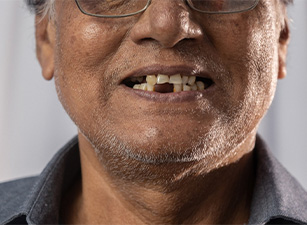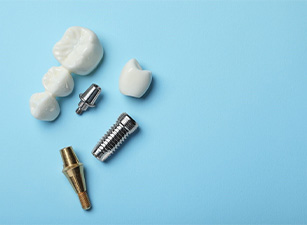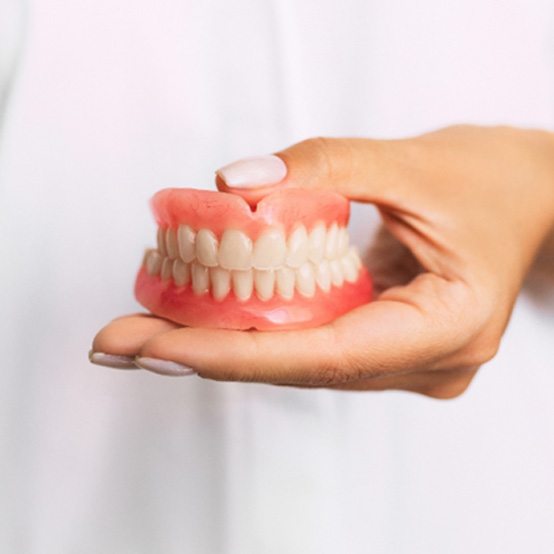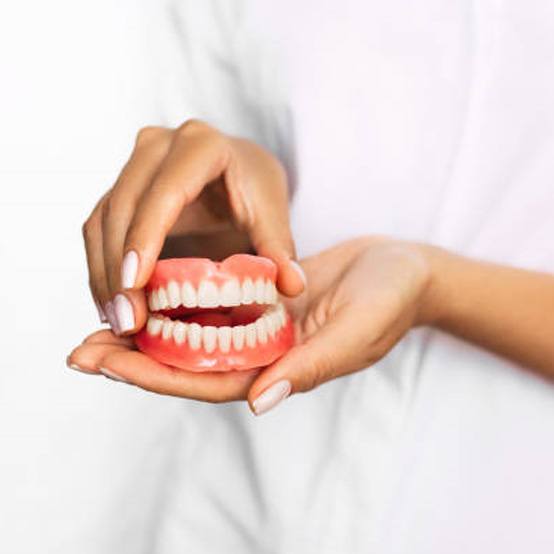Dentures Eugene
Feel Good About Your Smile Again
Are you missing most or all of your pearly whites? Tooth loss can have a devastating impact on your self-confidence and quality of life. Everything from eating and talking comfortably to enjoying your time with friends and family can be negatively affected by your missing teeth. At College Hill Dental, wee can help you feel good about your smile again with the help of partial or full dentures in Eugene! Come visit us today for your consultation and start your journey towards overcoming tooth loss.
Why Choose College Hill Dental for Dentures?
- Welcoming & Comfortable Modern Dental Office
- Your Happiness Is Our Top Priority
- Multiple Options to Help Make Dentures Affordable
Who’s a Good Candidate for Dentures?

No matter the teeth you’ve lost, nearly anyone can get dentures. Qualifying for these prosthetics isn’t a tricky matter. That said, you should consult Dr. Paskalev before you decide anything. He’ll assess your mouth to see if dentures might work. Even if you don’t qualify for treatment, though, you needn’t worry. You could always become a good dentures candidate with preliminary dental work. Alternatively, you could explore our other restorative options. As for the other details, keep reading or call our office today!
Effects of Missing Teeth

Before you weigh denture candidacy, review tooth loss’s causes and effects. Doing so lets you see how prosthetic teeth help.
Ultimately, many things could cause you to lose teeth. Tooth decay might make your chomper fall out or need pulling. Alternatively, you may get gum disease – an infection that erodes the tissues holding your pearly whites. If you’re especially unlucky, an accident or injury could knock your teeth out.
Unlike its causes, though, tooth loss effects are narrow but harsh. For instance, lacking teeth makes everyday tasks – eating, speaking, smiling, etc. – harder. It also creates smile gaps that slowly erode your jawbone. (This erosion will lead to facial collapse if left unchecked.) Adding insult to injury, these same gaps may tilt your other teeth until they fall out.
What Qualifies You for Dentures?

True, most people just need to lose teeth to qualify for dentures. These appliances don’t have harsh requirements. However, there are still a few things you should note.
Your mouth’s health is one such factor. After all, dentures won’t work if your gums and jaws are too weak. In that case, you’d lack the strength to secure your prosthetics. Still, you won’t get turned away due to sensitive or decayed teeth. Dentures could replace such offending chompers.
The number of lost teeth is crucial as well. Based on how many are missing, you’ll receive one of two possible dentures. First is the partial model, which only replaces a few teeth. The other option is a full denture that replaces all teeth along an arch.
Of course, your budget shouldn’t be left out either. The truth is that dentures are often the cheapest tooth replacements. Therefore, they’re the ideal choice for those with limited funds.
Alternative Tooth-Replacement Options

If Dr. Paskalev decides you don’t qualify for dentures, you needn’t worry. There are several ways to restore your full grin. In particular, our practice has a few other tooth replacements. These are:
- Dental Bridges – A dental bridge is a fixed dental restoration. Normally, it’s made of two crowns fused to a pontic. Once cemented into a space between nearby teeth, only a dentist can properly remove it.
- Dental Implants – Unlike dentures or bridges, dental implants are set in your jaw. Their titanium makeup lets them fuse with your jawbone and remain stable. Plus, they’re capped with dental crowns, blending with your other teeth. (All that said, implants can be pricey; their unique features often drive up their price.)
Types of Dentures

At College Hill Dental, we’re proud to offer numerous denture options to choose from. All of our dentures are crafted from high-quality materials that are biocompatible, durable, and natural-looking to ensure that you get the best results. Depending on your unique needs and preferences, we will recommend one of the following types of dentures.
Partial Dentures

A partial denture is a dental prosthetic designed to replace multiple missing teeth. Small, discreet metal clasps wrap around the existing tooth structure to hold the partial in place. The partial itself fits around and between your remaining teeth much like a puzzle piece. Partials are customized to match your teeth both in look and how your teeth come together in the bite.
Full Dentures

A full denture is a full set of artificial teeth designed to replace all of the natural teeth on either the lower or upper arch. Patients seek a full denture when they no longer have any healthy teeth remaining. A denture can support your facial shape structure, allow you to chew foods, and help with your confidence. Dentures are a complete row of plastic teeth that are set in a pink plastic mold.
Implant Dentures

With the help of dental implants, you can now enjoy a partial or full denture that is more lifelike than ever. These small titanium posts are positioned directly into the jawbone like the roots of natural teeth. This gives the denture they support unmatched stability, comfort, and functionality. What’s more, they can prevent jawbone deterioration and last a lifetime! During your consultation, we’ll help you determine if you’re a good candidate for implant dentures.
The Benefits of Dentures

Traditional removable dentures have long been a reliable way for countless patients to enjoy a full smile once again. When you choose to replace your missing teeth with this prosthetic, you can be sure to enjoy a wide range of benefits for your oral health and overall well-being. Here are some of the advantages to look forward to.
Psychological Benefits

Many people suffering from tooth loss often develop anxieties about their smile appearance, speech articulation, chewing ability, and more. Not only will missing teeth impact your oral health, but it can also significantly affect your self-esteem and confidence. In some instances, those struggling with this issue might avoid social events or engaging in interactions due to feelings of sorrow and depression. With dentures, you can address the main issue of tooth loss while also boosting your confidence in the long run.
Clearer Enunciation

Teeth are important for many daily oral habits, including enunciating your words and sounds clearly. Without all of your pearly whites, it can be quite difficult to say sentences effectively, which can put a damper on your conversations. By wearing dentures, you can provide your tongue and lips with the structure needed to enunciate your words more efficiently.
Improves Nutrition

Some foods can be quite tough to chew on, including certain fruits and vegetables. Missing even a single tooth can make it challenging to properly eat many food options, as your bite won’t be as strong as before. If left unchecked, tooth loss can end up leading to issues like malnutrition and indigestion. Fortunately, dentures can help complete your smile as well as improve your natural biting power, allowing you to include other kinds of meals in your diet.
Preserves Oral Health

Tooth loss, if left untreated, can often lead to problems like dental shifting, as any remaining natural teeth will want to fill the gap in your smile. Dentures can effectively serve as placeholders, preventing any other unwanted movements. Additionally, your prosthetic can help share some of the pressures of chewing, avoiding wear and tear on your tooth enamel.
Expands Opportunities

Having a full smile is incredibly helpful when it comes to making a first impression, as this is one of the initial things people will notice about you. If you’re preparing for a job interview or meeting someone new, being able to show off a nice grin can be a great benefit. Not only will you feel more confident and comfortable smiling, but others might perceive this as outgoing and attractive, which can help expand your opportunities in both your social and professional life.
How Dentures Are Made

If you’ve chosen to receive dentures for your tooth-replacement solution, then you can be sure to get the customized and lifelike prosthetics you need to enjoy a full bite again. At the same time, you might be wondering how exactly your new teeth are created once your dentist takes impressions of your smile. Keep reading to learn more about your future dentures as well as the behind-the-scenes action regarding how they’re made in the first place.
What Are Dentures Made Of?
Your personalized dentures will be made up of two main components:
- The base of your prosthetics will generally be fabricated out of a gum-colored acrylic material that is designed to blend seamlessly with the rest of your gum line. The base is also smooth so that it’s more comfortable when resting atop the gums. Full dentures can usually be made out of acrylic, but they can also consist of nylon or resin. Partial dentures, however, might be constructed with metal clips to help them attach to your nearby teeth.
- The artificial teeth are typically built out of either acrylic or porcelain, both of which can easily mimic natural tooth enamel. That said, acrylic is mostly used for partial dentures since this material won’t be as abrasive to your natural teeth. For full dentures, porcelain is the more popular option due to its appearance and durability.
The Denture Creation Process
Although dentures are one of the most convenient and affordable ways to replace missing teeth, they do involve several important steps to be completed. Here’s what the creation process looks like:
- Once your dentist has performed any necessary preliminary services, such as tooth extractions or gum disease treatment, we will take digital impressions of your mouth so that you don’t have to work with messy putty.
- Our team will then send your impressions and measurements of your mouth and jaw to a trusted dental lab where the technicians will work on developing a wax replica of your gum line. They’ll also place the artificial teeth in the material.
- After the replica is created, the technicians will send it to our office for a fitting. If the wax version fits you correctly, we’ll send them back with any adjustments so that the lab can continue fabricating your prosthetics. Once finished, the dentures will be thoroughly trimmed and polished to look completely natural-looking.
- The lab will send the finalized product back to us and you’ll return to our office for the final fitting. We’ll make any necessary minor adjustments to your prosthetics to ensure they are perfect and provide you with the bite you deserve. If all looks good, you’ll be free to enjoy your brand-new smile.
Adjusting to Your New Dentures
After receiving your new prosthetics, you might expect to experience some mild discomfort as your mouth gets used to wearing them. Fortunately, this is only a temporary adjustment period that will require constant practice and some time to overcome. Make sure to train your mouth every day to chew your food effectively as well as enunciate your words and sounds. If necessary, you might ask your dentist about denture adhesive to help you during your adjustment process. If you should notice any issues with your prosthetics, notify our team for help.
Understanding the Cost of Dentures

The amount you pay for dentures can vary depending on your specific needs. Rest assured that we will only move forward with the process once we’ve made sure that you’re fully aware of what the final price will look like. Our team will be glad to answer any questions you might have about the cost of dentures, and we can outline your financial options to make paying for your new teeth as straightforward and stress-free as possible.
Factors That Affect the Cost of Dentures
We’ll need to answer the following questions to figure out how much your dentures will cost:
- Are any preperations (such as tooth extraction) needed before you can receive dentures?
- What kind of material will be used to make the gum-colored base?
- What will your replacement teeth be made of?
Remember that when it comes to dentures (and other kinds of dental work), the less expensive option isn’t always the better one. Cheaper dentures tend to be made out of lower-quality materials that break more easily. Higher-quality dentures that last longer are often worth the extra cost.
Are Implant Dentures More Expensive?
An implant denture is supported by four or more dental implant posts in your jaw. Dental implant surgery naturally carries costs of its own, so implant dentures tend to be more expensive than traditional dentures. However, investing in dental implants can pay off significantly in the long run. Not only will you have a more lifelike smile that will let you eat whatever you want, but you can expect the implant posts to last for decades with proper maintenance.
Does Dental Insurance Cover Dentures?
Dentures are normally covered under dental insurance, though it’s important to remember that every plan is different. Since dentures are considered a major procedure, you can usually expect coverage to be around 50%.
You should call your dental insurance plan to confirm your benefits before you start the process of getting dentures. If you feel like you don’t fully understand your insurance coverage, we can review your plan with you. Furthermore, our team will file any necessary claims on your behalf and take the needed steps to ensure that you get the benefits you’ve earned.
Other Options for Making Dentures Affordable
If you don’t have any dental insurance coverage, we can still work with you to make paying for your dentures easier. At our office, you can take advantage of the following options:
- In-House Membership Plan: With our membership plan, you can enjoy discounts on various important services in exchange for an annual fee. Unlike dental insurance, our membership plan doesn’t have any deductibles that need to be met before your benefits kick in.
- CareCredit & Cherry Financing: We are proud to work with CareCredit and Cherry, which are third-party financing companies that gives you the option of paying for your dental care in smaller monthly installments. CareCredit and Cherry plans come with little to no interest, making it that much easier to get the treatment you need without breaking the bank.
Dentures Aftercare

Dentures are a versatile solution that can transform your smile’s appearance and functionality, regardless of the number of natural teeth you have remaining. However, even those who have lost entire arches still must maintain their dental health to prevent oral issues. For instance, you should continue to visit our College Hill Dental team every six months for a routine checkup and cleaning to avoid potential gum disease and screen your tissues for signs of oral cancer.
It’s also essential that you care for your new teeth correctly to preserve your smile. Continue reading to learn about how to help keep them in great shape, and feel free to contact us if you have any additional questions or concerns.
Removable Dentures
Remove After Eating
Although dentures don’t develop cavities, leftover food attracts bacteria that can cling to their surfaces to form plaque. This, in turn, can contribute to gum disease, chronic bad breath, or other issues. Thankfully, you can avoid this by removing your dentures to gently rinse them after meals. This removes germs and other particles to keep your mouth healthy.
Clean Your Restoration
You must also remove your new teeth twice daily to gently scrub them with a soft-bristled toothbrush and mild dish soap or a special cleanser. Remember, standard toothpaste and aggressive overbrushing can abrade the materials and should be avoided.
Then, if you’re reinserting them to continue your day, be sure to rinse them off so you don’t ingest any harsh chemicals that may be harmful if swallowed.
Keep Your Dentures Safe
The acrylic base of your dentures can become quite slippery when wet, and although the materials it’s made from are quite durable, they can crack, chip, or break if you drop them. You might try placing a towel or other soft cloth below you when you wash them to cushion their fall if they slip from your fingertips.
Additionally, it’s best to store them out of the reach of small children or pets, as they may not handle them carefully and could cause damage.
Remove Dentures When You Sleep
Your restoration presses firmly against your gums all day, which reduces the circulation. This can cause sores or periodontal problems that make wearing them uncomfortable. Not only that, but it can also increase the likelihood of developing respiratory issues, such as pneumonia.
It’s better to remove your dentures and leave them in a glass of room-temperature water or a special soaking solution overnight. This gives your tissues a well-deserved reprieve to recover. It also kills up to 99% of unwanted bacteria that cling to their surfaces and prevents drying out and cracking, which maintains their shape.
Notice Changes
Paying attention to your dental condition helps you identify changes that may indicate underlying issues that require treatment. For instance, if your gums appear darker or puffier than usual, you may be developing gum disease and should schedule an appointment with Dr. Paskalev to address it.
If you see chips or cracks in the surface of your dentures, you might feel tempted to try to fix them on your own. However, this isn’t recommended. You could make matters worse by trying to glue them together yourself, and the adhesive you have access to might not be intended for oral use. Please contact our team if you notice that your restoration doesn’t seem to fit, clicks when you open or close your mouth, or looks overly worn down, so we can assist you.
All-on-4 Dentures
Dentures that are anchored by dental implants are more permanent and aren’t intended to be regularly removed and reinserted like the traditional method. As a result, your care instructions look slightly different.
You should also brush your prosthetics twice daily with a soft-bristled manual or electric brush and non-abrasive toothpaste. Try to avoid products containing baking soda or other stain-removing agents, as they may not be effective on your restoration and could potentially harm it.
Then, you can floss with a threader to help reach beneath the base of your dentures. Many patients prefer to use an oral irrigator that can clean hard-to-reach spaces more easily. Finally, rinse with antibacterial mouthwash to prevent plaque and tartar from flourishing.
Denture FAQs

Our team here at College Hill Dental understands the toll that tooth loss can take on your physical and mental wellbeing! We want to be as helpful and supportive as possible as we guide you through the process of rebuilding your smile. We’ve gathered a few of the most frequently asked questions that we receive about dentures so that you can put any potential doubts to rest and feel confident about committing to restoring your smile and confidence. Of course, if you have any specific questions regarding dentures, feel free to give us a call for additional assistance.
Will It Hurt to Get Dentures?
You’ll likely experience some mild soreness for a few days after receiving dentures, but this isn’t something you should be fearful of. This discomfort can also easily be managed by taking your recommended over-the-counter and prescribed pain medication as instructed. That said, once you receive dentures, it’s normal to go through an adjustment period (usually a few weeks) during which your gums might feel irritated.
Is It Hard to Talk with Dentures?
It might take you a little while to become accustomed to speaking while wearing your dentures. For the first few weeks, you might talk with a lisp or stutter, or muffle your words. However, you can speed up this adjustment process by practicing reading out loud and conversing with loved ones who’ll support and encourage your efforts. Also, applying a small amount of adhesive can help to stabilize your dentures and make your speech a bit clearer.
Can I Sleep While Wearing My Dentures?
We advise against sleeping while wearing your dentures. Even though you can technically sleep while wearing dentures, we recommend taking them out before going to bed in order to give your gum tissue and jawbone a chance to recuperate after supporting them throughout the day. Removing your dentures before bedtime also gives you the perfect opportunity to soak them in a glass of denture cleaning solution or room-temperature water—if your dentures dry out, their shape might become warped! Lastly, taking your dentures out at night also encourages healthy blood flow in your gums, which is vital for their wellness.
What Qualifies You for Dentures?
There are primarily three different types of dentures: partial dentures, full dentures, and implant dentures—and each have different requirements. Partials are preferable for those who still have most of their teeth but need a few replaced. Full dentures are recommended if you’ve lost all of your teeth or don’t have enough natural teeth left that are worth salvaging. And implant dentures rely on dental implants to support the new prosthetics; however, it means you’ll need to have sufficient jawbone density for supporting them.





